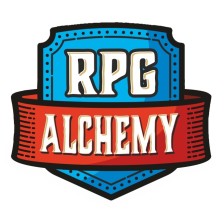The way in which I approach gamemastering has changed and evolved a lot over the years; every game I play and person I play with impacts my thought process and style. Of all the RPG elements I’ve been exposed to I think the way in which I look at success vs. failure has the most impact on my current approach.
At their mechanical core virtually all RPGs have a system to determine whether or not a character succeeds at a task or action. In a lot of older games (and some newer ones) this is usually a simple case of “you succeed” or “you fail”. Over the years many��games expanded on this idea with a system of “degrees” of success or failure designed to measure how successful you were (or weren’t). A few games have even added an element of benefit��or��detriment to their success or failure dichotomy. Regardless of the specifics all of these approaches force us to adapt a success/failure paradigm.
Prior to the start of my current 5th edition Dungeons & Dragons campaign, I ran Numenera, Dungeon World, and Ashen Stars. While all three of these games still utilize some sort of success/failure aspect��they all feature an element��of something else, the price of success. In Numenera a player can spend points from the Speed, Might, or Intellect pools to lower a difficulty or increase a result. These points are also the same ones that measure your health so they are the price your paying. In Dungeon World a roll of 7 – 9 (on 2d6) basically allows your character to do what they set out to do but at a cost or with a complication. And Ashen Stars uses the GUMSHOE system where you spend points to gain clues (preventing the game from coming to a dead-end with a failed “investigate” roll). All these games have caused me to think less about rolling dice to determine if something happens, and��more to determine the cost of it happening.
Looking at this I’ve asked myself if the idea of failure is really necessary in an RPG? Is simply not doing what you’re attempting really an��interesting outcome? Is the risk of failing the best way to produce tension and excitement? I’ve begun to feel that after a player describes what they are doing a “failure” result suddenly causes the scene to shift momentum��and sometimes feels disjointed. I think the main problem for me is that failure is often nothing happening, and nothing doesn’t feel like a result, and a result should follow and action. I think that is the key; when a character acts something should happen, never nothing. Cause and effect. Action and reaction.��That is immediate character agency propelling action and story forward.
I’ve embraced this idea as part of my current gamemaster paradigm. When the characters take actions in the game I’m running I’m focused on what effects their actions are having on the world and shifting my attention toward what “success” is costing them. Even in a game like D&D, which embraces a success/failure mechanic, I might describe the result of a character’s attack as hitting the enemy’s armor and shield and forcing him back regardless of the die roll, the difference between a “hit” and a “miss” simply being the subtraction of hit points as opposed to describing the character missing��their target. When the rogue is picking a door’s lock the dice roll isn’t telling me whether or not she picks it, but if she picks it before the guards come around the corner or if she keeps from breaking her tools while picking the lock.
I’ve got great players at my table that love describing the interesting and creative things their characters are doing. I like to reward their commitment and enthusiasm by not having their characters look incompetent because of an ill-fated die roll. Instead the dice are helping tell the story of what price they paid for their actions. The new 5th edition Dungeon Master’s Guide has a great optional rule that allows a character that barely failed a die roll to succeed, but with a DM determined consequence, “You do manage to stab the ogre, but as he turns he rips the sword from your hand!” I love this rule. Even though the DMG recommends using it when a player misses a target number by 1 or 2, I let my players enact the rule for up to a five-point “miss”. Consequences, and the price of success are so much more interesting and story propelling than a negative result.
So far this approach has already seen results at my table. I was worried that the players might start feeling like they were always succeeding and therefore not being challenged. However��I’ve seen players forced to consider��their choices and deal with the consequences of their actions. Instead of worry about if the can do something my players have become more focused on if they should do something. And if they decide to do something, what will it cost them, either now or in the long run? This has added so much more challenge and depth to our game and the players really feel as though their characters’ choices and actions mean something. No one at our table grabs a d20 and says “What’s the worst that can happen?”
For those of you intrigued by this idea I highly recommend it. In many cases you won’t need to make any drastic changes to your campaign or add any house rules, simply shift your perceptions away from “failure” results to a “price of success” paradigm and your game will change. The energy and momentum of your campaign will push the story forward and your players will feel like their characters are the masters of their own fate. If your game focuses on characters that are heroes your players will feel like they are more heroic and capable. In the long run players that feel as though their characters are more capable connect better with their characters and the campaign, and that makes your job as a GM that much easier.


You know, I had the same evolution. Just now, *W engine (Apocalypse World, Dungeon World etc.) is one of the finest tool that a Master could dream to possess to manage a RpG. Yeah, even Gumshoe system is priceless, if you are running an investigative adventure, however I feel that *W engine is near to perfection. You read it, so you know what I’m talking about. You explained the 7-9 results, with their success with a price (now pretty common in modern RpGs). But nothing in the rules force the Master to tell that a 6- result IS A FAILURE of the action. No, on the contrary, you as the Master, simply have to “make a move”. And make a move can be letting the action of the player to succeed, WHILE you work offscreen building tension, inserting new problems coming fast, or bringing another bigger problem just after the fleble success obtained with that 6-. Sweet, marvelous system is that one. So, you don’t have to cheat with the numbers (or fake-rolling low numbers behind a stupid master screen) to make the adventure go on. You have good rules, you master fair, and the players know that if their characters succeed with a 6- result, something is ready to happen in the fiction.
As a player I love these newer systems. I feel like I can do almost anything I want, but with caution. If I decide to charge into a group of enemies and smack the leader on the side of the head, I will probably succeed. But does it kill him? Do I trip and fall at the feet of the enemy after I inflict damage? Did my weapon fall out of my hands? Or did everything go as gloriously as I suspected (or even better)? It is so much more than, “I rolled a four. I missed. Next player.”
Samuel Van Der Wall recently posted…101 Star Wars Encounter Ideas (1-50)
Hi John,
A great article, and a solid tool for every GM.
I am a big fan of the graded results in HeroQuest 2 by Robin D Laws, which allow for all sorts of varied outcomes. Like yourself, my Players have embraced the more narrative approach, and the quality of our game has improved immensely.
All the best
Phil
Phil Nicholls recently posted…The December Home for the Warlock����s Journal
A great article,
After some experiencies with F.A.T.E. and Fiasco, i’m looking for ways to implement some mechanics of this two systems in my games. Everything has a price and a consequence, you can fail or sucess in your goal, but there is always an outcome of the action, and you must face it. This two systems focus on a co-narrative aproach of the game.
Best regards
Marcus
Thanks for your comments; I’m glad you found the article interesting. I really think the key to this starts with changing the way you and your players look at the function and purpose of your dice rolls. Shifting from a “success/fail” paradigm to a “cause/effect” paradigm opens up so many more doors. In addition you can use this concept in virtually any RPG without changing any of the actual mechanics of the game, just altering your approach to the narrative outcomes of the mechanics.
John Lewis recently posted…This Week In Roleplaying – December 12th, 2014
I personally run a rather light hearted campaign, so my group’s failures happen less often. Generally, if my players roll a 1, it becomes a hilariously spectacular failure, with the thief
Trying to pickpocket someone and pulling down his pants instead, or the fighter that swings his sword but throws it into the next room. However, if my characters roll a natural 20, I give them what we have nicknamed a “Legolas Kill.” When this happens, they succeed in such a way that they gain a a very good bonus, such as double damage or a double hit. If they score a 20 against what I consider a “minion” (regular monster for that dungeon), we count it as an instant kill.
I play original AD&D, so there are no critical hit rules in place.
What page of the DMG is this optional rule that you are referring to?
Page 242 of the DMG; Resolution & Consequences.
John Lewis recently posted…RPG Alchemy ���� 2015 Goals